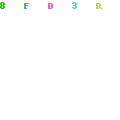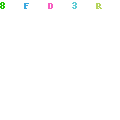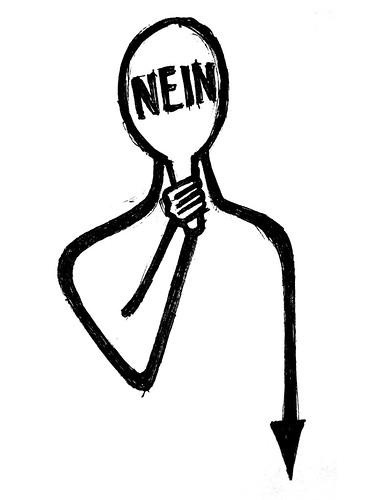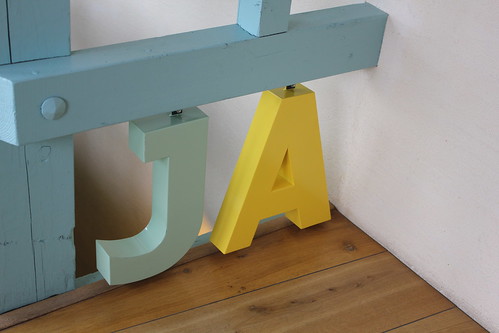Saying yes and no in German is quite simple. Most people know “ja” (“yes”) and “nein” (“no”), but there are other words that you can use to imply “yes and no”, without actually using those words. This will help spice up your German.
As an Amazon Associate, I earn from qualifying purchases.
But let us first look at how to pronounce yes and no in German.
Pronunciation
So the questions “how do you say no in German” and “how do you say yes in German” sometimes only need a simple answer. In other words, sometimes people only want to know how to pronounce “ja” and “nein“.
How to pronounce “ja“:
How to pronounce “nein“:
Different versions of “ja“
Ways of saying it that are similar to English
1 “okay” (“okay”)
You probably recognise this one as it is the same in both German and English.
2 “natürlich” (“naturally”)
Like the previous example, this one, is very similar to the English equivalent.
Direct Translations
1 “kein Problem” (“no problem”)
As you might have noticed, this one is a direct translation of its English equivalent.
2 “das Stimmt” (“that’s right”)
I think that the English translation makes this one self-explanatory, doesn’t it? If it doesn’t, leave a comment below and I’ll answer your questions.
3 “sicher” (“sure”)
This is quite a popular phrase in German, using it will make you sound like a native.
4 “jawohl” (“absolutely”, “affirmative” or “yes sir!”)
I often get the question “what is yes sir in German”. Well, here’s your answer. I think it sounds very military.
5 “das ist wahr” (“That is true”)
I mean, this one cannot always be used as a substitute for yes. But when answering a question asking if something is true, instead of opting for a simple “ja“, you can just say: “das ist wahr”.
6 “genau” (“exactly”)
When someone asks you, “Magst du mein Hemd?” (“Do you like my shirt?”), instead of “yes” you could simply say, “genau“. It is used in the same way that English people use “uh-huh”.
7 “das klingt gut” (“that sounds good”)
Once again the use of this one is the same in both languages. If someone were to pitch an idea to you and then ask if you think that it could work, instead of saying “yes”, you could answer with, “das klinkt gut“.
8 “gerne” (“gladly”)
If someone invited you to go to the movies with them, the saying “yes” in German could look like this, “gerne“.
9 “gewiss” (“certainly”)
As with many others, “gewiss” is used as “certainly” would be in English. Just remember that the “w” in German sounds very much like a “v” in English.
10 “0hne Zweifel” (“without a doubt”)
Once again we are confronted with a direct translation. This makes life so much easier for us, doesn’t it?
11 “freilich” (“sure!”)
There is no way that I would have guessed that “freilich” and “sure” are buddies. But they are and, thus, we are, like before, confronted with a direct translation.
12 “selbstverständlich” (“obviously”)
Like the previous phrase, I would never have guessed that these two are one and the same.
Options that are completely different between the languages
Sometimes how you say “yes” in German, is not a direct translation from the English version.
1 “zustimmen” (“to agree” with someone)
This option for yes in German is a separable-prefix verb. This means that you cannot use it as it is and you have to change it according to the sentence in which it is used.
2 “bestimmt” (“for sure”)
Use this one to make your answer even more definite, if it is possible for a yes to be a more definite yes.
3 “also gut” (“ok then”)
This one is definitely not a direct translation, as “also” means “so”, “thus” or “like” in English. It definitely does not translate directly to “okay”. The same goes for “gut“, which is not “then”, but “good”.
4 “klar” (“of course”)
“How to say of course in German?” is another question on a lot of German learners’ minds. Now you don’t have to wonder anymore, because this is your answer.
5 “auf jeden fall” (“definitely”)
Why on earth one word in English is three in German, no one knows, but using this phrase, will “auf jeden fall” make you sound more like a native.
6 “doch” (“yes”)
“Doch” is just one of those German words that are used for basically everything. In this case, however, it means “yes”. The catch is just that for “doch” to be “yes” in German, it has to be the answer to a negative question. For example:
Also, sie sind nicht einkaufen gegangen?
So, they didn’t go shopping?
If they (whoever “they” are) did, however, do shopping you would just answer with, “doch“.
Different versions of “nein“
An Explanation as “No”
Germans often rather give an explanation to soften the blow when they are trying to be polite. For example, when someone asks you to the movies, you could say:
Leider habe ich keine zeit.
Unfortunately, I do not have time.
They also tend to add “entschuldigung” or “tut mir leid“, which both mean I’m sorry. An example of this is:
Entschuldigung, leider habe ich keine zeit.
I’m sorry, unfortunately, I do not have time.
Phrases for “No”
1 “auf gar keinen Fall” (“under no circumstances”)
This one is also one of the firmer ways of saying no.
2 “lieber nicht” (“rather not”)
To avoid a direct no, one could also use this as a version of no in German. Let’s use the same example as before (someone asking you to the movies). A possible answer could be:
Ich gehe lieber nicht ins Kino.
I’d rather not go to the movies.
3 “nee” (“nope”)
This is a slight twist of the normal German word for “no” (“nein“) and is also used to soften the blow of saying “no”. An answer to the question: “did you go to the movies?” could be “nee“.
4 “nö” (“no”)
“Nö” is not used very often and is seen as one of the harsher ways to say no in German.
5 “nich” (“naw”)
This word comes from the German word for “not”, which is “nicht“.
6 “gar nicht” or “überhaupt nicht” (“not at all”)
This one speaks for itself. It is saying no with implying that it is out of the question, seeing as some people think that “no” is not a clear answer.
7 “absolut nicht” (“absolutely not”)
Well, this one is similar to the previous one.
Conclusion
Sometimes there are many ways to say the same thing. And sometimes the other ways could be more polite or in some cases firmer. What do you think? Can you think of any forms of yes and no in German that I did not put in here? Tell me in the comments and I’ll add it.
xoxo,
Charlé
P.S. If you liked this post and would like to be notified when I post new content, feel free to join my mailing list. You can also save it to Pinterest to read it again later by clicking on the button below:
Similar Reads
Advanced German Sentence Structure
Article Changes due to Case Changes
Adjective Endings in German
Pronouns in German Made Easy
There are a million ways to say yes and no in German. Whether you’re accepting a party invite or sending a door-to-door salesman on his way, here are some German phrases that’ll set you up and give your ‘yesses and nos’ a lot more power!
Photo: weltum on flickr.com under a CC license (CC BY-SA 2.0)
Ways to say nein – no
Das interessiert mich nicht – That doesn’t interest me
Das will ich nicht – I don’t want that
Das kann ich nicht – I can’t do that
Das mag ich nicht – I don’t like that
Ich kann nicht – I can‘t
Ich habe keine Zeit – I don’t have time
Das geht (momentan) nicht – It’s not possible (at the moment)
Vielleicht nächstes Mal – Maybe next time
Ich bin (momentan) beschäftigt – I’m busy (at the moment)
Ich habe zu viel zu tun – I’ve got too much to do
Ich habe zu tun – I’ve got things to do
(An unusual-sounding phrase that literally translates to ‘I have to do’, omitting what it is there is to do. Though it might sound odd, it is correct German!)
Lieber nicht – I’d rather not
Dieses Mal kann ich nicht – I can’t this time
Ich habe schon Pläne – I already have plans
Soften the blow of a nein:
Depends who you’re talking to and how badly you want to get rid of them, right? Add the following onto the front of any of the above phrases if you want to soften the blow of your no:
Es tut mir Leid, aber… – I’m sorry, but…
Danke, aber… – Thanks, but…
Ways to say ja – yes
Photo: kongharald on flickr.com under a CC license (CC BY-SA 2.0)
Das wäre… gut/toll/usw. – That would be … (good/great/etc.)
Gerne – Gladly
Natürlich – Of course
Natürlich mache ich das – Of course I’ll do that
Natürlich gehe ich – Of course I’ll go
Auf jeden Fall – Definitely
Ich freue mich (schon) – I’m looking forward to it (already)
Das klingt gut – That sounds good
Das wird sicher Spaß machen – I’m sure that’ll be fun
MAYBE!
Now what about those times when you’re not sure if it’s a yes or a no? Or perhaps don’t want to say no outright, but you know you’re not really interested? We’ve all used that glorious word ‘maybe’ when really we mean ‘no’! Here are a few ways of saying maybe in German.
Ways to say vielleicht – maybe
Photo: smemon on flickr.com under a CC license (CC BY 2.0)
Ich weiß noch nicht – I don’t know yet
Ich überlege es – I’ll think about it
Ich muss zuerst darüber nachdenken – I need to think about it first
Ich muss zuerst checken– I need to check first
Ich sag es dir morgen/später/am Dienstag/nächste Woche – I’ll tell you tomorrow/later/on Tuesday/next week
Hoffentlich – Hopefully
Ready to learn German with us? Try Transparent Language Online for free for 14 days!

If you visit a country and you don’t speak the language very well, it can be difficult to find your way around at first. Having a few basic language skills can significantly improve your situation.
When you begin learning a new foreign language, you don’t start with sentences, you start with words. The first things you usually learn are "Yes" and «No.» Knowing how to express your desires can be extremely useful in a foreign country — a simple «No» can save your life, and a short «Yes» can open many doors.
As we want lots of open doors for you when you decide to visit Germany or travel other German-speaking countries, and help you boost the language-learning process, today, we will talk about the many ways to say «Yes» in German and how to show affirmation in general. Let’s learn some new vocabulary together!
Learn German with Langster
1. «Ja» Is the German «Yes»
You may have heard it before, but «ja» is the short and simple word in German for «yes.» As in most languages, in German, there are multiple ways to say it. You might find people using the words «jap», «yep,» or even the English word «yes,» to name a few examples of a more informal way to say «ja.»
For English speakers, the pronunciation is simple. The German «j» sounds similar to the English «e.» As a result, the best way to pronounce words beginning with «j» like a German is to imagine that they start with an «e.» Try pronouncing «ja» as «eja.»
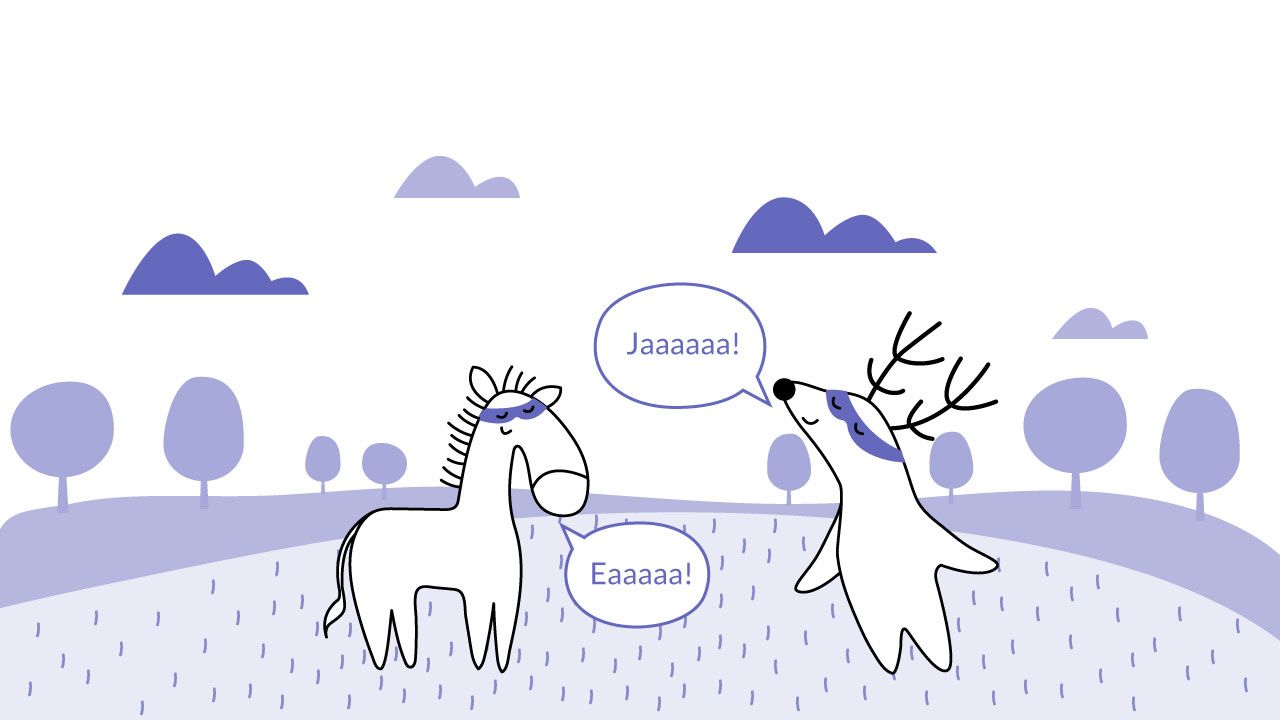
Aside from «ja,» which is the direct equivalent of «yes» and the inverse of «nein» (which is «no»), there are some other ways to say «yes» in German in more specific situations. We’ll go over them in the following sections.
«Yes» As an Affirmation
If someone proposes something or expresses an idea you agree with, you can say «Ich stimme dir zu,» which means «I agree with you” instead of simply saying «yes.» To make this phrase more formal, change the pronoun «dir» to «Ihnen» and say «Ich stimme Ihnen zu.»
German
English
I agree with you (informal).
I agree with you (formal).
If you want to confirm someone’s statement, such as «that is true,» you can use the phrases «das stimmt» or «das ist wahr» in German. By using those phrases, you are supporting the speaker.
German
English
That’s right.
«No Doubt» in German
Moreover, in English, you can say «no doubts» to express how certain you are about a situation. In German, the phrase «ohne zweifel» or «zweifellos» has the same meaning and can also be used to support the speaker.
«Exactly» in German
Another word that you will most likely hear a lot in this context is «genau.» The English equivalent is «exactly,» and Germans use it frequently during conversations.

2. «Doch» As a Response to a Negative Statement
Consider the following scenario: someone makes a negative statement such as «We will not make it to the bus station until 8 pm,» and you disagree. In the English language, you would say «Yes, we will,» using the same «Yes» you would use for affirmations.
In this type of situation, the German language has a specific word. Germans express the inverse of a negative statement by saying «Doch.» So, if someone says, «There is no bus today,» but you know there is, you say, «Doch» instead of «Yes.»
German
English
Yes (in a response to a negative statement).
Responding to a negative question works the same way. If somebody asks,
German
English
Did you not listen?
but you did listen, the answer is
German
English
Yes, I did.
The pronunciation of «Doch» would be /dox/, a sound that you will find often when learning German.
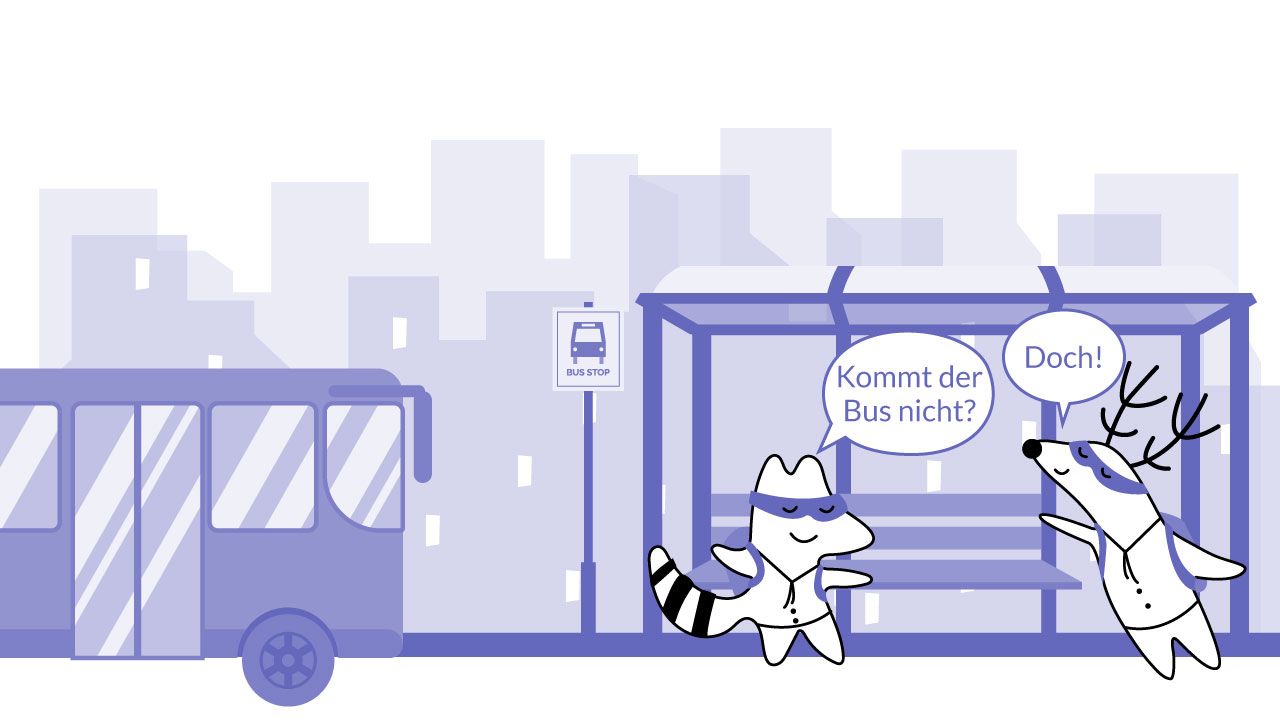
3. Agree to a Suggestion by Saying «Yes» in German
People in Germany enjoy hanging out in groups and spending time together. As a result, you may find yourself in discussions about what to do next because several people must coordinate and agree on a single plan at the same time.
So, if you want to express that you like an idea in order to steer the discussion in a specific direction, you have several options. First, you can say «das klingt gut,» meaning literally «that sounds good» in English.
German
English
That sounds good.
«Definitely» in German
Besides «das klingt gut,» you can also use the phrase «auf jeden Fall», which would be literally translated like «in every case,» but the English equivalent is «definitely.» A similar answer is the English word «surely,» which would be «sicher» in German.
German
English
Definitely.
4. How to Express that You Are Fine With the Situation
Sometimes you might also want to make sure that the other person knows that the situation or the plan seems good for you by saying, «yes, no problem.» In this case, you can use the phrase «ya, kein problem» in German, which means the same.
German
English
Yes, no problem.
If you don’t have an opinion on a particular topic or if you’re just open to anything, you have another option. In the same way as you would say «yes, why not?» in English, you can say «ja, warum nicht?» in German.
German
English
Yes, why not?
Bonus: A Euphoric «Yes» for Special Situations
You surely know the situations in which people use words like «oh yeah» in English or «bravo» in Italian to express their joy with what is going on. The German word for that is «jawoll,» and you will hear it in various settings and situations throughout Germany.
You mostly will find people screaming that word because usually, they use it when they feel excited or euphoric. Perhaps you will hear your next-door neighbor yelling «Jawoll!» because he is watching football or your friends saying it because they were correct about something.
It can be an answer to something or simply a way to express your feelings, but it is usually associated with a cheerful mood. So, instead of pondering for too long about how to describe the pleasant energy you have, you can simply yell, «Jawoll!»
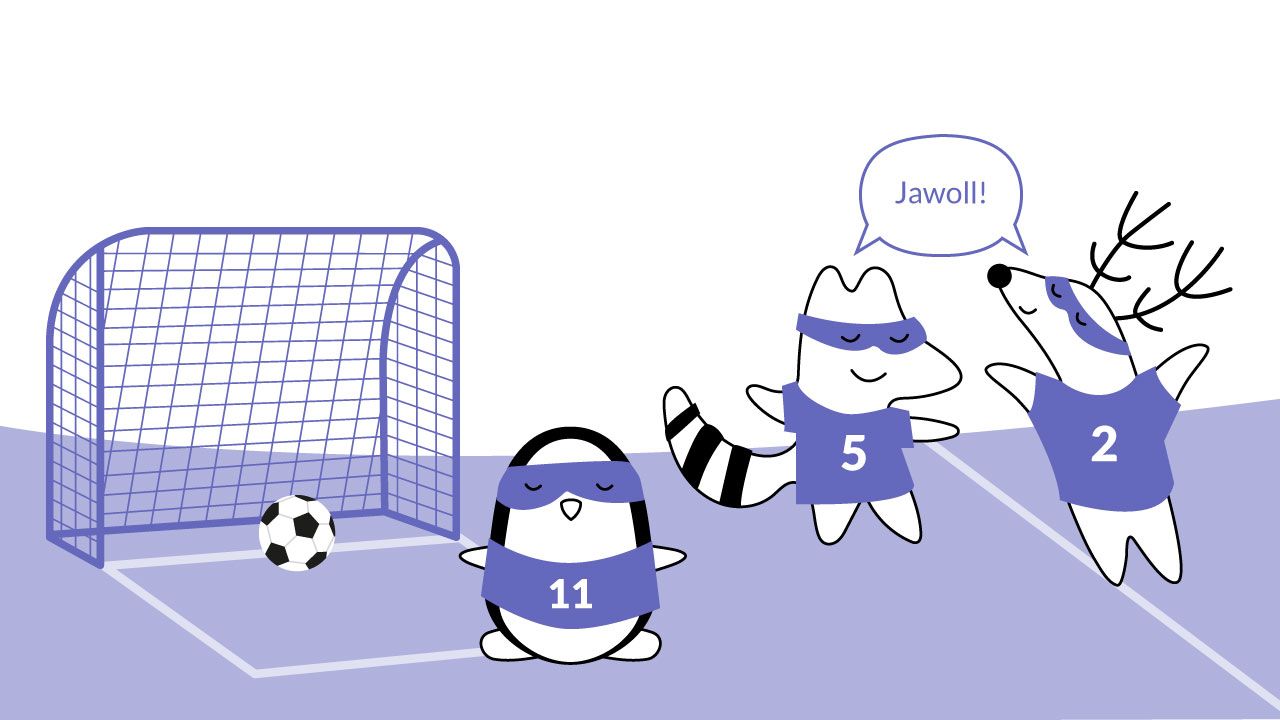
What Have You Learned?
To summarize, let us go over the various German words for saying «yes» one more time. Aside from the standard «ja» as a response to a question that you want to confirm, there are other options to say «yes» depending on the context.
You have several options for expressing your support for someone’s statement. You can say «das stimmt» (that is true), «genau» (exactly), «auf jeden Fall» (definitely), or «zweifellos» (no doubts).
When someone makes a negative statement that you disagree with because you know the positive opposite is true, you respond with «Doch» (Yes). We’ll look at a short sentence to remember: «Da ist kein Ausgang» (There is no exit) — «Doch!» (It is, indeed).
We wish you good luck with learning German and hope you have the chance to say the word «ja» soon in a variety of situations. If you want to learn more words in German, check out our website or check out the Langster app.
Saying no and yes in German are probably the first few words anyone who wants to learn a new language will master. You can get by in any foreign language by knowing these powerful words. If you’re looking for an easy answer, then the word you are looking for is “ja”, the word “yes” in German. But sometimes, just the word yes in German is not enough to say what you need, or maybe it is too bland for you. So let’s discover other words and phrases that you can use to say yes in the German language.
Brief Intro To The German Language
Before we dive into it, let me quickly give you some points you need to know about German language, especially for those who are not familiar with it.
- German and English share more than 50% of their vocabulary. That is a piece of reassuring information for new learners. However, the words are not necessarily the same, they might have slightly different ways to spell and of course, different sounds and pronunciations.
- There are three genders in German. Many languages have feminine and masculine nouns, but there is a third gender called neuter in German. This is the same as the Romanian language and others.
- There is an extra letter in German. You might find a peculiar letter in a German word, “ß”. The name of this letter is “eszett” or a “scharfes S” which means a sharp S. This letter is the only letter impossible to appear at the beginning of a German word.
How To Spell Yes In German?
Just as I have mentioned above, you already know the German counterpart of the English word “yes”, which is spelled and written “ja“.
How To Say Yes In German?
However, saying “ja” may not be enough to make you sound like a native or even a fluent speaker. There are many reasons to say yes, even as a tourist; there are even more perks if you speak like a native.
So here are multiple ways to say yes in German.
1. Sounds Good!
“Sounds good” in German is “Das klingt gut”.
- Pronounce: dus-kling-goot
- The word “das” is actually “that” in English.
2. I Agree (With You)!
To translate this phrase in German, you can go with “ich stimme ihnen zu”
- Pronounce: eech-stuh-may-ee-nun-zoo
- The phrase above is actually more suitable for a formal setting, or if you want to address people with a higher status.
- You can go for “ich stimme dir zu” if you want to casually address a friend.
- You can also just say “stimmt” if you are unsure of using formal or informal language; it means “I agree”.
3. Definitely
“Auf jeden Fall” can be translated into “in any case” or “at any rate”
- Pronounce: uh-woof yae-dun fuh-l
- You can just say “auf jeden” if the other person is a friend.
4. That Is True
If you are stuck and lost in a conversation, you can just agree by saying “das ist wahr”.
- It literally means “that is true.
- Pronounce: dus-eest-var
5. The German Word Doch
The word “ch” in German words is pronounced by using the back of your throat. It is not a familiar sound for English speakers; the easiest way to describe is the feeling when you need to spit out phlegm from the back of your throat.
Doch is one of the most common german words used in learning German. The direct equivalent for the word in English should be “however” or “yet”. For example,
He is smart yet arrogant.
Er ist klug und doch arrogant.
However, you can also use doch if you want to answer a negative question or a negative statement. For example:
“You do not like fish?” “Yes, I do!”
“Du magst keinen Fisch?” “Doch, ich will!”
If you use “ja” instead, it would be wrong and unnatural. SO do not forget to use the correct word!
More Useful Words!
Different ways to say yes in German language.
| English | German |
|---|---|
| Yes | Ja |
| Yes / yes, sir | Jawohl |
| Anyway / Yes | Doch |
| Yes | Jaaa |
| Okay | Okay |
| No problem | Kein problem |
| I Agree with you | Ich stimme Ihnen zu |
| That is true | Das ist wahr |
| Certainly | Gewiss |
| Sure | Sicher |
| Sure | Freilich |
| Das klingt gut | That sounds good |
| Of course | Klar |
| For sure | Bestimmt |
| Naturally | Natürlich |
| Definitely | Auf jeden fall |
| Obviously | Selbstverständlich |
| Without a doubt | Ohne Zweifel |
| Exactly | Genau |
| Gladly | Gerne |
| Yes (casual) | Jepp |
| Absolutely | Absolut |
| You are right | Du hast Recht |
| You are right | Sie haben Recht. |
| Surely / of course | Na klar |
Simple Phrases
| English | German |
|---|---|
| Yes, he is | Ja, er ist. |
| Yes, she is | Ja, ist sie. |
| Yes, of course. | Ja, natürlich. |
| Yes, of course. | Ja, sicher |
| Yes? | Ja? |
| Oh yes. | Oh ja. |
| Why not? | Warum nicht? |
| Yes Please. | Ja, bitte |
| Yes, it’s agreed | Ja, ist gebongt |
| Yes, they were | Ja. Sie waren. |
| yes, please | danke gern |
| yes, it is | ja, es ist |
| Well, yes. | Na ja. |
| and yes | und ja |
| Yes, I’d love to | Ja, gerne. |
| I couldn’t agree more with you (formal) | Ich bin ganz Ihrer Meinung. |
| I couldn’t agree more with you | Ich bin ganz deiner Meinung |
Yes, But Not Really?
All these examples are perfect for agreeing and confirming, but what if you are hesitant? You can try these terms instead:
| English | German |
|---|---|
| Yes (reluctant) | Also gut |
| Yes, maybe. | Ja, vielleicht |
| Yes, we’ll see | Ja, mal sehen |
| Yes, kind of | Ja, schon |
| Probably | Wahrscheinlich |
| Could be | könnte sein |
| Maybe | Eventuell |
German Language Learning
It is ok to learn these just for the sake of brownie points. Warum nicht? If you want to learn more, you should definitely check out Ling App by Simya Solutions. It is an amazing app that allows you to learn German in the most convenient way. All you need to do is to install the app on your smartphone and consistently use it for a few minutes every day and let it do its magic. It has unlimited functions like exercises, quizzes, and lessons that can help you master German (or other languages) in no time. Try it now!
What are your hobbies? Who is your favorite actor? Where do you work? Such questions can help you get to know someone new. German question words is the key to holding a conversation longer. The more questions you ask, the faster you are going to learn about the other person.
Being able to ask some basic questions is an essential part of learning any new language. It will help you to strike conversations and avoid awkward silences. Let’s start with this lesson now!
What are German Question Words
You all must be familiar with the concept of Wh- questions in English. They are called so because, all the question words begin with the letters Wh, except the question word how.
German question words are nothing but Wh- question words. Wh- questions are known as W-Fragen in German. Using the simple question words in German, you will be able to ask people their names, phone numbers, how they are feeling and much more.
The 9 basic German Question Words are as follows:-
| What | Was |
| Where | Wo |
| Where from | Woher |
| Where to | Wohin |
| Who | Wer |
| When | Wann |
| Why | Warum |
| Which | Welche |
| How | Wie |
As you can see in the table above, W-Fragen are called so because, all the German question words begin with the letter W. Few other commonly used question words are as follows:-
| Since when | Seit wann |
| With whom | Mit wem |
| How long | Wie lange |
| How much | Wie viel |
| How many | Wie viele |
| Is there | Gibt es |
| Whose | Wessen |
Podcast

While asking questions, all the other question words remain the same, except “wer” and “welch“.
Declension of “Wer” and “Welch”
Just like masculine article der, the word wer (who) also gets declined according to the four cases.
- Nominative – Wer
- Accusative – Wen
- Dative – Wem
- Genitive – Wessen
The word welch (which) too changes depending on the case, gender and number. The declension is as follows:-
| Mask. | Fem. | Neut. | Plural | |
| Nominative | welcher | welche | welches | welche |
| Accusative | welchen | welche | welches | welche |
| Dative | welchem | welcher | welchem | welchen |
Apart from Wh- questions, there is one more way to ask questions. That is, yes-no questions. These are called so because, they can be answered with just a simple “yes” or “no”.
Now, let’s try to learn how to form sentences with these German question words.
In order to form a Wh- question in German, start with the question word first. The conjugated verb takes the second position, followed by the subject of the sentence. If there is anything else in the question, then it is placed after the subject.
For example, Wann ist das Konzert? (When is the concert?) Here, the question word “wann” is first, the verb “sein” is second and the subject “Konzert” is third.
Another example – Warum kommt er immer spät? (Why does he always come late?) Here, the subject is “er“. The rest of the information “immer spät” goes at the end (after the subject).
The sentence structure in German is a bit different from other languages. So, never translate questions from your mother tongue to German.
In English, we ask – What is your name? The word “what” translates to “was” in German. However, we use the word “wie” (how) to ask the same question in German. Wie heißen Sie?
Forming yes-no questions in German is a little simpler. Start with the conjugated verb first. The subject is placed at the second position. The rest of the information follows the subject.
For example, Kommen Sie aus Berlin? (Are you from Berlin?) Here, the verb “kommen” is first, the subject “Sie” is second and the other information “aus Berlin” is at the end.
For both types of questions (yes-no and Wh), the verb is always conjugated according to the subject. Check out our lesson on Verbs if you don’t remember different kinds of verbs and how to conjugate them.
Difference between “Wo”, “Woher” and “Wohin”
You may have noticed earlier, that there are 3 ways to form questions using “where”. This question word changes depending on the context (wo/ woher/ wohin). There is no such change of the word “where” in English.
Have a look at these 3 questions:-
- Wo ist meine Tasche? (Where is my bag?)
- Woher kommt deine Lehrerin? (Where is your teacher from?)
- Wohin gehst du dieses Wochenende? (Where are you going this weekend?)
“Wo” is used when you need to know about a place or where something / someone is right now. It does not imply movement. “Woher” means “from where”. It is used when you want to know where someone / something comes from.
“Wohin” implies movement from one place to another. It means “to where”. It is used when you need to know where someone is going (to).

Basic German Questions
You have learned enough about German question words. Now, it’s time to form some simple questions using them. Here are 15 basic questions in German that you should know, if you wish to have a small introductory conversation with someone.
Use “Sie” instead of “du” during formal conversations.
| English | German |
| What is your name? | Wie heißt du? / Wie ist dein Name? |
| How old are you? | Wie alt bist du? |
| Where are you from? | Woher kommst du? |
| Where do you live/ stay? | Wo wohnst du? |
| How are you? | Wie geht es dir? |
| What do you do in your free time? | Was machst du in deiner Freizeit? |
| Do you have siblings or are you the only child? | Hast du Geschwister oder bist du das einzige Kind? |
| What is your mother-tongue? | Wie ist deine Muttersprache? |
| Which languages do you speak? | Welche Sprachen sprichst du? |
| Since when have you been learning German? | Seit wann lernst du Deutsch? |
| When will the course start again? | Wann fängt der Kurs wieder an? |
| Who is your favorite singer? | Wer ist dein Lieblingssänger? |
| What are your hobbies? | Was sind deine Hobbys? |
| How long have you been living here? | Wie lange lebst du schon hier? |
| Are you single or married? | Bist du ledig oder verheiratet? |
German Grammar Exercise
Do you want to practice what you learned in the lesson? Click here to take the quiz and test your knowledge of German question words.
If you enjoyed learning this lesson, also check out the topic Imperative in German on your favorite blog “All About Deutsch”.
Want to learn more about German question words? Go through this article on The German Project.
PS
– On this blog, you will find grammar lessons just like this one,
vocabulary lists divided subject-wise as well as articles related to
countries like Germany, Austria and Switzerland and a lot more. Keep
scrolling, keep learning!

By
Last updated:
January 2, 2023
“He who doesn’t ask questions remains dumb.”
Sounds a little harsh, doesn’t it?
Believe it or not, that’s from the theme song for “Sesamstraße,” the German version of “Sesame Street.”
This line was even parodied by oddball German electronic musicians Deichkind in the title track from their album “Niveau Weshalb Warum”: Wer uns fragt, bleibt dumm. (He who asks us remains dumb.)
The original song is all about the need to ask questions in order to understand the world around you, and while it might sound inappropriate to call children dumm, the actual advice is pretty solid.
And it’s true for foreign languages, too.
You must know how to ask questions in any language that you’re learning.
That’s what we’re covering today: how to ask questions using a variety of different question words in German.
Download:
This blog post is available as a convenient and portable PDF that you
can take anywhere.
Click here to get a copy. (Download)
Ja oder nein? Yes-no questions in German
First, we need to establish the two most common types of questions you can ask in English and in German. The first, and possibly the easiest, is the category of yes-no questions. As the name implies, these are questions that can be answered with a simple ja oder nein (yes or no). Questions like these always start with a verb. This is something English and German have in common. Let’s compare the two:
Sprechen Sie Deutsch? (Do you speak German?)
This question highlights the similarities between our two cousin languages. Personally, I think German is even less complicated than English in this respect, because learners of German don’t have to fuss with inserting various forms of the helping verb “to do” in order to be grammatically correct. Just take the German verb—in this case, that’s sprechen (to speak), conjugate it normally and throw it at the beginning of the sentence. Then you’ve got your subject, Sie, and anything that comes afterwards. This verb-subject-object order is all you need.
If a question requires more than one verb, the extras go at the very end.
Können Sie mir helfen? (Can you help me?)
Now we’re working with two verbs: können (can) and helfen (to help). This is where the two languages diverge a little bit, but not much. Conjugate the first verb and put it at the beginning, just like we did before. The second verb goes all the way at the end, and in this example, it’s untouched. No conjugation necessary.
Hast du deine Hausaufgaben gemacht? (Have you done your homework?)
Again, the first verb haben (to have) is conjugated at the beginning. Then we have our subject, du, and our object, deine Hausaufgaben. At the end, we have the second verb we need: gemacht (done). This time, that second verb is conjugated. That’s because we’re working with a verb tense that requires this. You can read more about German verb tenses and word order here.
Is all this starting to sound a bit boring and grammar-heavy? Sorry. There’s no good way around that when it comes to this stuff.
Wer, wie, was…? German question words
You may have heard of the “5 W’s” in English: who, what, when, where, why (and sometimes also how). These are considered to be the main indicators of questions that can’t be answered with a simple yes or no, and that’s our second type of question. These require more information in order to give a complete answer.
The good news is that these question words also start with the letter W in German. The bad news is that W isn’t pronounced the same, and some of the words resemble each other in misleading ways.
Let’s take it step by step.
Wer (who)
The most important thing here is to not confuse the German word wer with the English “where.” Yes, they look alike. They even kind of sound alike. But wer means “who.” No exceptions.
Wer ist die Bundeskanzlerin? (Who is the Chancellor of Germany?)
Was (what)
This one is perhaps a bit easier. It’s got that similar A in it, so there’s not much you can confuse it with. Just be sure to pronounce it with a hard S sound. This word does not have the Z sound like the English verb “was.”
Was hast du gestern gemacht? (What did you do yesterday?)
Wann (when)
Again, similarities between English and German will lead you in the right direction here. Follow your instincts.
Wann hast du Geburtstag? (When is your birthday?)
Wo (where)
Just when you thought it would be intuitive from here on out, the other shoe falls. Wo looks a lot like the English word “who,” doesn’t it? Gotcha. Wo is actually “where.” For this reason, the tendency to mix up wo/wer for who/where has been the bane of beginning German students’ existence for generations. Don’t worry. You’ll get them straight with enough practice.
Wo ist meine Brille? (Where are my glasses?)
Wieso, weshalb, warum (why)
Yes, there are multiple ways to say it. You’ll probably learn warum first, and it is more common than the others, but don’t let the other ones confuse you when you run into them. There’s no significant difference in meaning among these three, though if you ask a German native speaker they might ramble a bit about how they might have tiny nuanced differences that you don’t need to master just yet.
Besides, if you listened to the “Sesamstraße” song already, this should already seem familiar. The full lyric from the beginning of this post goes Wieso, weshalb, warum? / Wer nicht fragt, bleibt dumm! (Why, why, why? / He who doesn’t ask remains dumb!)
Wieso/weshalb/warum bist du hier? (Why are you here?)
Wie (how)
Unlike English, which has “how” as the weird stepbrother of the otherwise alliterative 5 W’s, German uses consistent W’s all the way through its question words. “How” is wie in almost all of the cases you could think of. That includes “how many” and “how much,” which can be frustratingly similar, so watch out.
Wie hast du das gemacht? (How did you do that?)
Wie viel kostet das? (How much does that cost?)
Wie viele Geschwister hast du? (How many siblings do you have?)
Where-from do you come? Preposition drama
In English, only ridiculously strict grammar teachers still believe that you shouldn’t end sentences with prepositions. But in German, this is actually mandatory. In order to comply with this rule, you’ll need to shift any prepositions to the beginning of the question. Sometimes this even requires a bit of compounding.
Mit wem arbeitest du? (Who do you work with?)
The most direct translation here would be “With whom do you work?” The only problem is that most people don’t really speak that way anymore in English, so it might feel a bit odd to think of it that way.
Wovon redest du? (What are you talking about?)
“What-about are you talking?” doesn’t really work in English. We don’t have a compound word like that to begin with. This is where direct translation can get you into trouble.
Woher kommst du? / Wo kommst du her? (Where do you come from?)
Wohin gehst du? / Wo gehst du hin? (Where are you going [to]?)
When using the question word wo (where) with a sense of motion or direction, you’ll need to add an equivalent of “to” or “from” most of the time. This is where woher (where-from) and wohin (where-to) become mandatory.
However, after all the explaining I just did about moving prepositions and compounds to the beginning of the question, this is actually the one area where the German rule is starting to break down and look a bit more like what we do in English.
Most German textbooks will still teach you sentences like Woher kommst du? But then if you actually come to Germany, you’ll hear people say Wo kommst du her? all the time. You have to be able to adapt to German as it’s actually spoken, because you can’t just rely on the German you learn from books or school.
Whether you’re a child watching “Sesamstraße” or an adult rapping along to Deichkind’s bizarre club anthems, you need to know how to ask questions. If you know how to ask yes-no questions and you can back them up with the 5 (or 6) W’s, then you’ve already got the grammar tools in your hands.
Now all that remains is to go forth and learn by asking questions.
Remember: If you don’t, you’ll just stay dumb!
Download:
This blog post is available as a convenient and portable PDF that you
can take anywhere.
Click here to get a copy. (Download)
We’ll learn all you need to know about yes or no questions in German, including a few common phrasings and a really common structure to reply.

and welcome to a new episode of the epic YourDailyGerman online course – the course that uses the hottest learning technology the year 2022 has to offer…
reading.
I mean, little TikToks are super educational but reading… maaaan… it sucks at first, but once you’re used to it, it’s awesome.
Anyway, today, we’ll do the second part of
“How to ask Questions in German”
Last time, after a quick general overview over the topic, we focused on the questions that have a question word.
So questions like:
- Who am I?
- Why are we?
- What is reality?
- When does the milk expire?
If you have doubts about those, then check out part 1 here.
Today, we’ll talk about the questions that DON’T have a question word – the so called yes or no-questions:
- Is there such thing as reality?
- Is there a reason for our being here?
- Can reality be defined by an individual?
- Does milk expire?
Those are equally important if you want to have a conversation and building them is actually ridiculously simple. Unless your native language is English… then, it is kind of like throwing a ball with the left hand :).
And besides learning how to build them, we’ll also look at some common useful patterns and to top it off, we’ll talk about an incredibly common way of answering to these questions – it’s super easy and it’ll make you sound super native and it’s nothing you’ll find in any of those fancy video courses and textbooks.
Here are the quick links if you want to jump around (though it’s not really all that much jumping this time).
- The Grammar of Yes or No Questions
- Some really important Yes or No patterns in German
- A REALLY cool way to answer
And now. let’s dive right in 
Oh no… looks like you just reached the limit you can read for free.
2 posts a week are for free.
If you want more – why not become a member?!
Find out more
As a member you’ll get unlimited access to the entire archive with over 700 articles on vocabulary and grammar – with lots of information you won’t find anywhere else. Not in class, not in a textbook and not Duolingo or Youtube.
And you get other premium features like pdf-download, progress tracking, note taking and comment notifications. And more cool stuff in the pipeline, because I am actually actively working on this project.
Already a member?
Log in here:
Log In
4.9 43 votes
Article Rating

